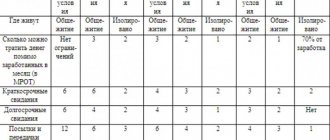On the participation of a defense lawyer in the case of changing the type of correctional institution of a convicted person
At the beginning of December 2021, a trustee turned to me for legal assistance, since a case was about to be heard on the transfer of her husband, a convict from a settlement colony to a high-security correctional colony.
As the trustee explained, her husband was convicted of committing a crime related to illegal drug trafficking and sentenced to 9 years in prison to be served in a maximum security correctional colony.
After 6 years of serving his sentence in the named colony, with a conscientious attitude to work and exemplary behavior, the convict raised the question of changing the type of correctional institution from a maximum security correctional colony to a settlement colony.
At the same time, the administration of the correctional institution supported the petition of the convict to change the type of correctional institution, since he was characterized positively, firmly embarked on the path of correction, and the court granted this request and issued a ruling to change the type of correctional institution from a maximum security colony to a settlement colony.
The convict was transferred to further serve his sentence in a colony settlement in the Ryazan region.
Earlier, during a transfer to the Federal Penitentiary Facility No. 1 of the Federal Penitentiary Service of Russia in the Ryazan Region, during a personal search of the convict in his hand luggage, the inspector found three SIM cards, which was reflected in the report.
Immediately after the discovery of the prohibited items, the convict wrote an explanation in his own hand, in which he expressed sincere repentance.
The administration of PKU SIZO-1 of the Federal Penitentiary Service of Russia in the Ryazan Region issued a resolution to place the convicted person in a punishment cell for a period of 15 days. In addition, the convicted person additionally faced another, more severe punishment. The head of the FKU SIZO-1 of the Federal Penitentiary Service of Russia in the Ryazan region issued a resolution recognizing the convicted person as a persistent violator of the established procedure for serving the sentence.
I consider this decision to be unfair and unnecessarily cruel, since the convicted person conscientiously served his sentence for 6 years, received 17 commendations, and mastered four specialties.
After arriving at the colony-settlement at FKI IK-5 of the Federal Penitentiary Service of Russia in the Ryazan Region, the convict was immediately placed in a punishment cell, from which he was released only two months later.
The head of FKU IK-5 of Russia for the Ryazan Region sent a proposal to the Skopinsky District Court of the Ryazan Region to change the type of correctional institution, to transfer the convicted person to further serve a sentence of imprisonment from a settlement colony to a maximum security correctional colony.
In this situation, my provision, at the request of the trustee, of legal assistance to a convicted person in uniform, participation in a court hearing on changing the regime of detention, seemed to me to be ineffective and, moreover, a deliberately losing option, which was confirmed by judicial practice.
Having started providing legal assistance, I set a priority task - to file an administrative claim with the Zheleznodorozhny District Court of Ryazan to challenge the actions of the administration of the pre-trial detention center-1 of the Federal Penitentiary Service of Russia in the Ryazan region, to declare it completely illegal and to cancel the decision to apply a penalty to the convicted person in in the form of placement in a punishment cell and on declaring illegal and completely canceling the decision recognizing the convicted person as a persistent violator of the established procedure for serving the sentence, initiating an administrative case and scheduling a court hearing.
The basis for filing a statement of claim was the illegal and unjustified application of a penalty measure to the convicted person in the form of placement in a punishment cell and recognition of him as a malicious violator of the established procedure for serving the sentence.
At the same time, the defense indicated that the administration of pre-trial detention center-1, in violation of Part 1 of Art. 117 of the Penal Code of the Russian Federation, when applying penalties to a person sentenced to imprisonment, the circumstances of the violation, the identity of the convicted person and his previous behavior are not taken into account.
The ruling of the Zheleznodorozhny District Court of Ryazan on the acceptance of an administrative case for court proceedings and the appointment of a court hearing made it possible to file a petition with the Skopinsky District Court of the Ryazan Region to postpone the scheduled court hearing to change the type of correctional institution, since the subject of consideration of the presentation of the head of PKU IK-5 from the contested actions of the administration of pre-trial detention center-1.
At the same time, numerous complaints were filed, including to the prosecutor's office of the Ryazan region, about the illegal actions of the administration of correctional institutions.
During the study of the material on bringing a convicted person to disciplinary liability, significant violations of the penal legislation of the Russian Federation, the Order on approval of the Uniform Regulations on the Commission of the Correctional Institution of the Federal Penitentiary Service of Russia in the Ryazan Region, responsible for the application of penalties to those sentenced to imprisonment, were revealed. In violation of the established procedure for imposing penalties, officials of the FKU SIZO-1 of the Federal Penitentiary Service of Russia in the Ryazan Region, participating in the meeting of the disciplinary commission and entitled to influence the imposition of a disciplinary punishment on the convicted person, compiled certificates that distorted the essence of the inspection carried out (the meeting of the commission was held in the absence of the convicted person, explanations from him were not received). These circumstances indicated a violation of the rights of the convicted person when bringing him to disciplinary liability.
Thus, the conclusions of the officials of the FKU SIZO-1 that the convict did not admit guilt and did not draw the proper conclusions for himself did not correspond to reality and indicated that they took a formal approach to the inspection and did not conduct preventive conversations with the convict.
As a result, an illegal decision was made to place the convicted person in a punishment cell for a period of 15 days and a decision to recognize the convicted person as a persistent violator of the established procedure for serving the sentence.
I would like to note that during the period of consideration of the materials in the Zheleznodorozhny District Court of the Ryazan Region and in the Skopinsky District Court of the Ryazan Region, new penalties were applied to the convicted person. By a resolution of the head of FKU IK-5, four more penalties were imposed on my client in the form of placement in a punishment cell (the convict illegally spent about two months there). The imposed penalties also had to be challenged in court. I had no illusions that with the end of the next penalty, the convict would be released to the site of the colony-settlement. Providing legal assistance to a client was reminiscent of fighting against “windmills.”
At the same time, the prosecutor's office of the Ryazan region for the supervision of compliance with laws in correctional institutions issued a resolution by which the head of the FKU SIZO-1 of the Federal Penitentiary Service of Russia in the Ryazan region ordered the application of a penalty measure to the convicted person in the form of placement in a punishment cell for a period of 15 days, as well as The decision recognizing him as a persistent violator of the established procedure for serving his sentence was canceled as illegal and unfounded.
In addition, later, during an inspection at PKI IK-5 of the Federal Penitentiary Service of Russia in the Ryazan Region, the Ryazan Regional Prosecutor's Office for Supervision of Compliance with Laws in Correctional Institutions examined materials on the imposition of penalties on a convicted person. According to the results, all four decisions of the head of the correctional institution FKU IK-5 of the Federal Penitentiary Service of Russia in the Ryazan Region on placing the convicted person in a punishment cell were canceled as illegal and unfounded.
On August 21, 2021, the Skopinsky District Court of the Ryazan Region considered the petition of a lawyer acting in the interests of a convicted person for parole from further serving his sentence. During the court hearing, the court examined and assessed in aggregate all the materials of the case, took into account the behavior of the convict, his characteristics, his attitude to work while serving his sentence, the presence of incentives, the absence of outstanding penalties and came to the conclusion that the convict had developed a respectful attitude towards society, towards labor, norms, rules and traditions of human society and developed law-abiding behavior, which, by virtue of Art. 9 of the Penal Code of the Russian Federation indicates the correction of the convicted person, due to which he does not need to further serve the sentence assigned to him. As a result, the court granted the request of the lawyer acting in the interests of the convicted person for conditional early release from further serving the sentence.
Criminal Executive Code of the Russian Federation, Article 78 of the Penal Code of the Russian Federation
1. Depending on the behavior and attitude to work during the entire period of serving the sentence, the type of correctional institution may be changed for those sentenced to imprisonment.
2. Positively characterized convicts may be transferred to further serve their sentence:
- a) from prison to a correctional colony - after the convicted person has served in prison at least half of the term assigned by the court verdict;
- b) from a special-regime correctional colony to a high-security correctional colony - after the convicts have served in the special-regime correctional colony at least half of the term assigned by the court;
- c) from general regime correctional colonies to a settlement colony - after convicts in light conditions of detention have served at least one quarter of their sentence;
- d) from strict regime correctional colonies to a settlement colony - after the convicts have served at least one third of their sentence; for those convicted who were previously released on parole from serving imprisonment and who committed new crimes during the remaining unserved part of the sentence - after serving at least half of the sentence, and for those convicted of committing especially serious crimes - after serving at least two-thirds of the sentence.
2.1. The term of serving the sentence determined for changing the type of correctional institution is calculated from the day the convicted person is taken into custody.
2.2. A convicted person for whom the type of correctional institution may be changed, as well as his lawyer (legal representative) have the right to apply to the court with a petition to change the type of correctional institution. The convicted person submits a petition to change the type of correctional institution through the administration of the institution or body executing the sentence in which he is serving his sentence in accordance with Article 81 of this Code. The administration of such an institution or body, no later than 10 days after filing a petition from a convicted person to change the type of correctional institution, sends the said petition to the court along with a character reference for the convicted person. The characterization must contain data on the behavior of the convicted person, his attitude to study and work during the entire period of serving the sentence, on the attitude of the convicted person to the committed act and that the convicted person partially or fully compensated for the damage caused or otherwise made amends for the harm caused as a result of the crime . The characteristics of a person who, based on the conclusion of a forensic psychiatric examination, is recognized as suffering from a disorder of sexual preference (pedophilia), which does not exclude sanity, and who is convicted of committing, at the age of over 18 years, a crime against the sexual integrity of a minor under fourteen years of age, must also contain data on compulsory medical measures applied to the convicted person, on his attitude towards treatment. Simultaneously with the petition of such a convicted person, the conclusion of his attending physician is sent to the court.
2.3. The administration of the institution executing the sentence in which the convicted person is serving his sentence in accordance with Article 81 of this Code, in accordance with part two of this article, submits to the court a proposal to change the type of correctional institution in relation to a positive convicted person. The proposal to change the type of correctional institution must contain data on the behavior of the convicted person, his attitude to study and work during the entire period of serving the sentence, the attitude of the convicted person to the committed act and that the convicted person partially or fully compensated for the damage caused or otherwise made amends for the harm. caused as a result of a crime. In a proposal to change the type of correctional institution to a person who has been convicted of committing, at the age of over 18 years, a crime against the sexual integrity of a minor under fourteen years of age, and is recognized on the basis of the conclusion of a forensic psychiatric examination as suffering from a disorder of sexual preference (pedophilia), which does not exclude sanity , must also contain information about the compulsory medical measures applied to him, about his attitude towards treatment. Simultaneously with the presentation of such a convicted person, a report from his attending physician is sent to the court.
2.4. In case of transfer of a convicted person for further serving of a sentence from one correctional institution to another, the administration of the correctional institution to which the convicted person was transferred immediately notifies the victim or his legal representative, if the personal file of the convicted person contains a copy of the ruling or court order to notify the victim or his legal representative representative
3. The following are not subject to transfer to a colony-settlement:
- a) those convicted of particularly dangerous recidivism;
- b) those sentenced to life imprisonment in case of replacement of this type of punishment by way of pardon with imprisonment for a certain period;
- c) convicts for whom the death penalty by way of pardon has been replaced by imprisonment;
- d) convicts who have not undergone compulsory treatment, as well as those requiring special treatment in closed medical institutions;
- e) convicts who have not given written consent to be transferred to a settlement colony.
4. Convicts who are persistent violators of the established procedure for serving a sentence may be transferred:
- a) from a settlement colony to a correctional colony, the type of which was previously determined by the court;
- b) from the colony-settlement to which they were sent by court verdict, to a general regime correctional colony;
- c) from correctional colonies of general, strict and special regimes to prison for a term of not more than three years, with the remainder of the sentence being served in a correctional colony of the type of regime from which they were sent to prison. Convicts sentenced to life imprisonment, convicts for whom the death penalty was commuted to life imprisonment by pardon, as well as convicted women are not subject to transfer to prison.
4.1. Those sentenced to imprisonment and serving a sentence in a colony-settlement, who have evaded receiving the order provided for in part one of Article 75.1 of this Code, or who have not arrived at the place of serving the sentence within the period established in the order, the type of correctional institution may be changed to a general regime correctional colony.
5. The type of correctional institution is changed by the court.







